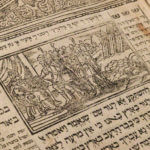Largely driven by an interest in the Kabbalà and Jewish mysticism, the study of Hebrew had become increasingly popular among 15th century Christian intellectuals and clergy.
Figures such as Yochanan Alemanno, Samuel Abravanel and Baruch of Benevent taught many distinguished Christian scholars. Among them was Cardinal Egidio da Viterbo who later called forth Elia Levita.
By 1504, Levita had become an established teacher at the Jewish academy of Padua to students who came from all over to study there. Levita chose as textbook Moses Kimchi’s grammar entitled “Journey in the Path of Knowledge” (1160-1170).
He probably used a copy he had made annotated and was so successful that his pupils asked him to publish it. Suddenly however the plague broke out in Padua and the copy was stolen and successively printed without Levita’s name. It became a success and was was reclaimed by his commentator during his Venetian years. It was later translated by Sebastian Münster into Latin (1536).
After the League of Cambray’s army took Padua, Levita fled to Rome where he offered his services to Egidio da Viterbo.
As time went by however, the Jews were increasingly vexed by the avowal that the object of the Christian in studying Hebrew was to proselytize them; that many prominent Jews had been gained over by the Church, and that at this very period of Levita’s life, no less a man than the pious and learned Jacob ben Chaijm, to whom the world is indebted for the celebrated Rabbinic Bible, had also embraced Christianity. Christians on their hand, now in battle with one another as Protestants and Catholics, deeming each other heretics, both directed their resentment to Jews for not relinquish their religion.
Renato Maestro Library, photos by Mayank Austen Soofi
On seeing me (at his place) he enquired after my business; and when I told him that I devote my life to the study of Hebrew; he once rose from his seat and embraced me saying: Are you forsooth Elijahu whose family traveled over countries and whose books circulate everywhere? Blessed the Lord of the Universe for bringing you here; you shall be my teacher and I will be a father to you. Elia Levita
Elia Levita comfortably navigated different environment in society of different cities. However he expressed firm criticism of the first Rabbinic Bible which he regarded as inaccurate in its adherence to the Jewish tradition of text.
Within the ten years between the establishment of his print shop and the arrival of Elia Levita in Venice, the indefatigable and enterprising Bomberg had already issued from his press the first two editions of the celebrated Rabbinic Bible, the one edited by Felix Pratensis (1516-1517), a converted Jew, and the other by Jacob b. Chajim (1524-1525), who also embraced Christianity; two beautiful editions of the Hebrew Scriptures without the Rabbinic commentaries (1518,1521); the first complete edition of the Babylon Talmud, which is the model of all succeeding editions; the editio princeps of the Jerusalem Talmud (1528); the editio princeps of the first Hebrew concordance to the Scriptures, by Isaac Nathan b. Kalonymos (1523).
Thanks to his reputation, Levita had no difficulty in finding occupation in Venice. Indeed Bomberg, who was the great center of Hebrew literature in this city, knew Levita personally, and published a poem of his in his second edition of the Rabbinic Bible, two years before his arrival at Venice. He therefore employed him as corrector of the Hebrew Press, and editor of Hebrew works. His first endeavor at Bomberg’s was the edition of David Kimchi’s (1160-1235) Hebrew Lexicon, called the Book of Roots which was corrected by Ischia b. Eleazar Parnas and revised by Levita, who also wrote a laudatory poem in form of Epilogue (1529).
References: Christian David Ginsburg, The Massoreth Ha-massoreth of Elias Levita, 1867



